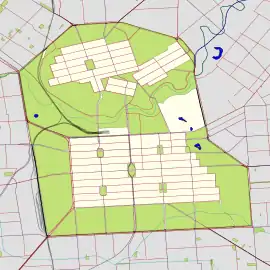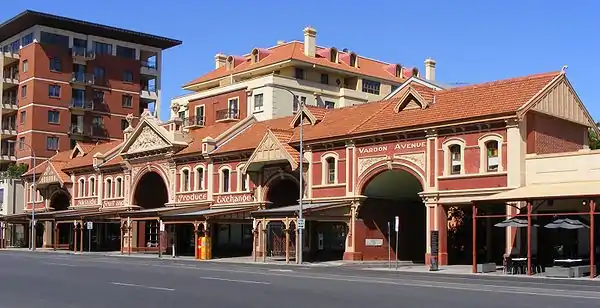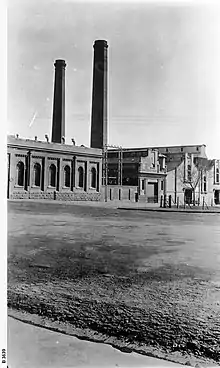East Terrace, Adelaide
East Terrace marks the eastern edge of the Adelaide city centre. It is one of the main north-south thoroughfares through the east side of the city.[2] Although the terrace essentially runs north-south between North Terrace and South Terrace, unlike Adelaide's other three terraces, its path is far from a straight line; travelling the entire length of East Terrace requires turning at right angles at most intersections from Pirie Street onwards. These days however, the traffic flow, after a swerve to the east between Grenfell and Pirie Streets, continues southwards over the Pirie intersection into Hutt Street and on down to South Terrace.
East Terrace | |
|---|---|
| Adelaide | |
 Southern end Northern end | |
| Coordinates |
|
| General information | |
| Type | Street |
| Location | Adelaide city centre |
| Length | 2.05 km (1.3 mi)[1] |
| Opened | 1837 |
| Major junctions | |
| Southern end | South Terrace, Beaumont Road |
| Northern end | North Terrace, Botanic Road |
| Location(s) | |
| LGA(s) | City of Adelaide |

After crossing South Terrace, East Terrace continues through the parklands as Beaumont Road, but unlike other roads through the parklands it is not a thoroughfare; there is a break in the middle of it.
The terrace marks the eastern edge of Colonel William Light's plan for the City of Adelaide. Between Grenfell Street and North Terrace, it also forms the boundary of Adelaide's East End.
East Terrace separates the city centre from the eastern parts of the Parklands, running adjacent to Parks 13 (Rundle Park), 14 (Rymill Park), 15 (Ityamaiitpinna),[3] and 16 (Victoria Park). The western edge of the terrace is occupied by shops, restaurants, cafes, office buildings, professional, consulting and medical practises, residences, a school, and a number of churches and pubs.
Since July 2012, a dedicated bus lane in both directions has existed between Grenfell Street and North Terrace.[4][5]
Historic buildings

On the corner of Grenfell Street and East Terrace there is the old Grenfell Street Power Station building. Much of the building now houses the Tandanya National Aboriginal Cultural Institute, facing Grenfell Street (which was heritage-listed on the SA Heritage Register in November 1984[6]), but the old converter stations face East Terrace. There is an "Historic Engineering Plaque" on a ground level plinth just east of the north-east corner of the Tandanya building, which was dedicated by the Institution of Engineers, Australia, the Electricity Trust of South Australia and the Adelaide City Council on 6 April 1995.[7]
See also
![]() Australian Roads portal
Australian Roads portal
References
- Google. "East Terrace" (Map). Google Maps. Google.
- The others are Pulteney Street, Frome Street, Hutt Street, and to a much lesser extent, Gawler Place.
2003 Adelaide Street Directory, 41st Edition. UBD (A Division of Universal Press Pty Ltd). 2003. ISBN 0-7319-1441-4. - Park 15: Ityamaiitpinna, Adelaide City Council
- Installation of bus priority lanes Grenfell Street, Currie Street & East Terrace Department of Planning, Transport & Infrastructure May 2012
- Adelaide bus lanes Australian Bus issue 53 September 2012 page 6
- "Heritage Places [241-259 Grenfell Street Adelaide]]". SA Heritage Places Database Search. Retrieved 23 December 2020.
- Institution of Engineers, Australia. SA Division. Engineering Heritage Branch (17 July 1996). "Historic Engineering Marker at the Grenfell Power and East Terrace Converter Stations (Issue 2)" (PDF). Cite journal requires
|journal=(help)